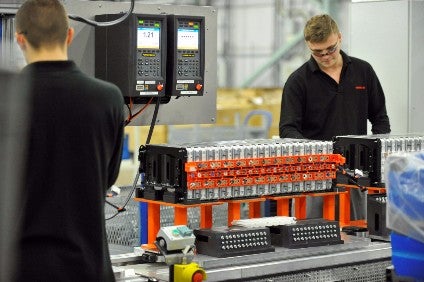The race is on to establish the UK's first battery 'gigafactory'. The British government is expected to give details of its planned £1bn investment into UK battery manufacturing later this week with regions including the West Midlands, Wales and the North-East competing to secure investment. Gigafactories are seen as critical parts of the EV supply chain and enable the mass manufacture of batteries at a scale that brings the price of EVs closer to parity with ICE-engined vehicles and, thus, promotes growth in the EV market.
Europe has found itself on the back foot in the battery sector throughout the 2010s. China has established itself as the largest producer of lithium-ion cells for EVs, with the largest production capacity in the world. Supply in North America has been partly secured through Tesla's Nevada gigafactory, supplemented by its New York facility and a potential third factory in either Texas or Oklahoma, while other North American OEMs are preparing to pivot to battery construction.
There are now 16 gigafactories planned or under construction in Europe, including a Tesla-owned one in Berlin. As the UK prepares to negotiate post-Brexit trade deals, the need for its own competitive gigafactory has grown. In addition, the demand for electric vehicle batteries in UK automotive manufacturing will only increase as the government prepares to announce a formal ban on the sale of new combustion-powered vehicles at an earlier-than-proposed date of 2030. UK-based manufacturers such as Jaguar-Land Rover, Nissan and BMW will be lobbying the government to convince it to build the UK's gigafactory close to their established operations to cut down on transport costs.
At Tesla's battery day in September 2020 – a bellwether for the overall automotive battery industry – the company spelled out its predictions for Li-ion demand growth throughout the 2020s. Estimates put the production of EV-specific Li-ion battery storage in 2019 at a little more than 95GWh – Tesla expects that number to rocket to 10,000GWh (10TWh) of annual Li-ion demand from EVs by 2030. That's on top of the additional 10TWh it predicts will be demanded by the growing static energy storage industry. If Tesla's correct in its demand assumptions, it means that battery supply will have to increase far beyond current plans.
Tesla's demand projection is good news for upstream players such as mining companies. Demand for lithium is expected to grow 55 times by 2030 compared with 2019 levels, along with a 20-fold increase in cobalt demand, a 26-fold increase in graphite and a seven-fold increase in nickel. Tesla, itself, expects to account for 3TWh of production in 2030, enough for it to build 20 million electric cars per year along with significantly ramping up production of its solar-generation and static storage products.
Investment in the UK's gigafactory depends on partnerships between the government and third-party companies. While manufacture of cells will take place in the UK, retaining some of the value chain within the country, supply of components and raw materials will have to come from foreign third-party companies – Asian battery giants including LG Chem, CATL and Panasonic are all potential partners, along with a number of mining operations for the supply of raw materials.







